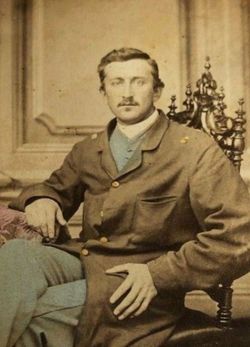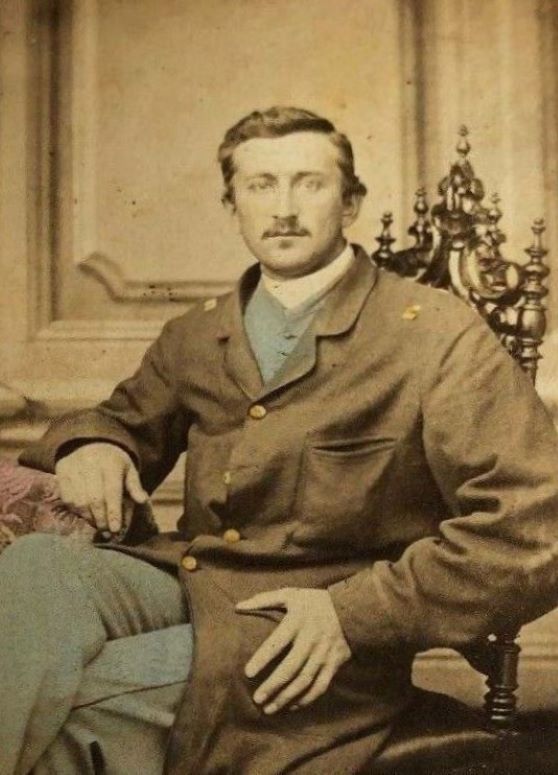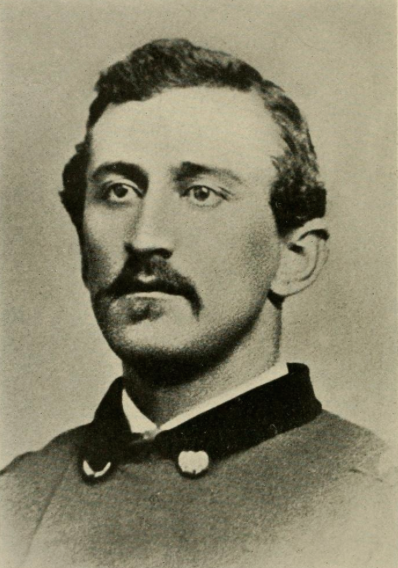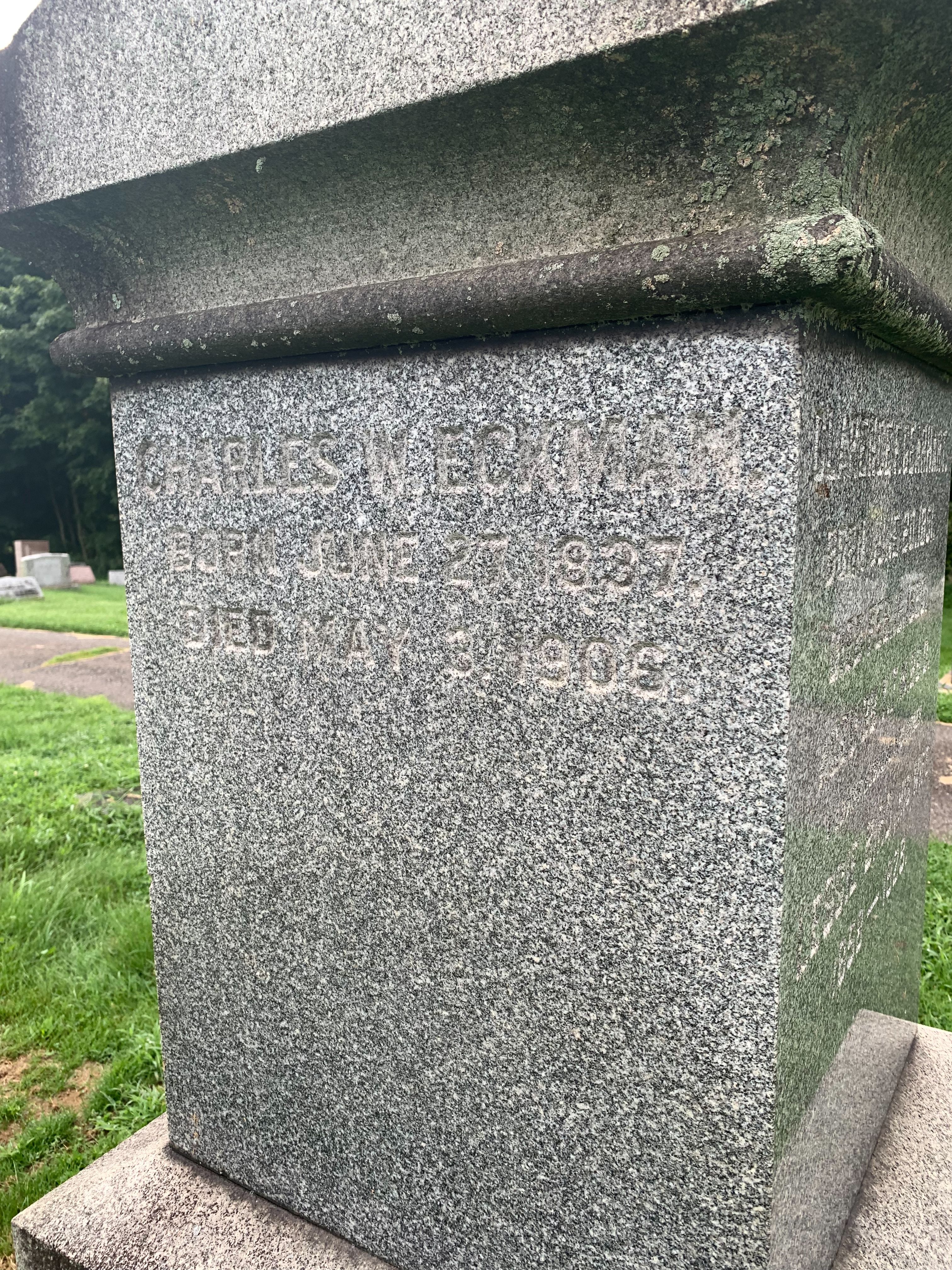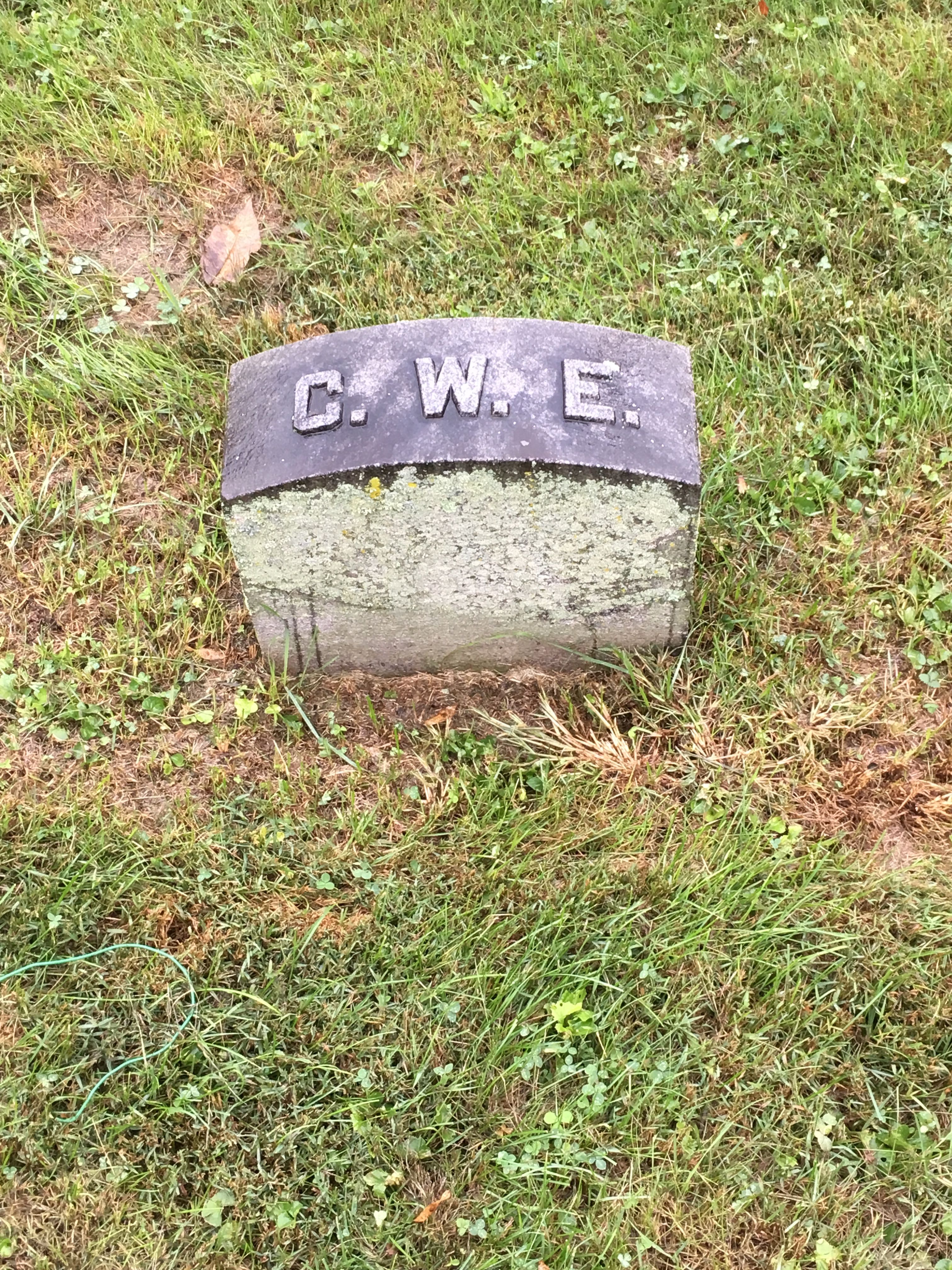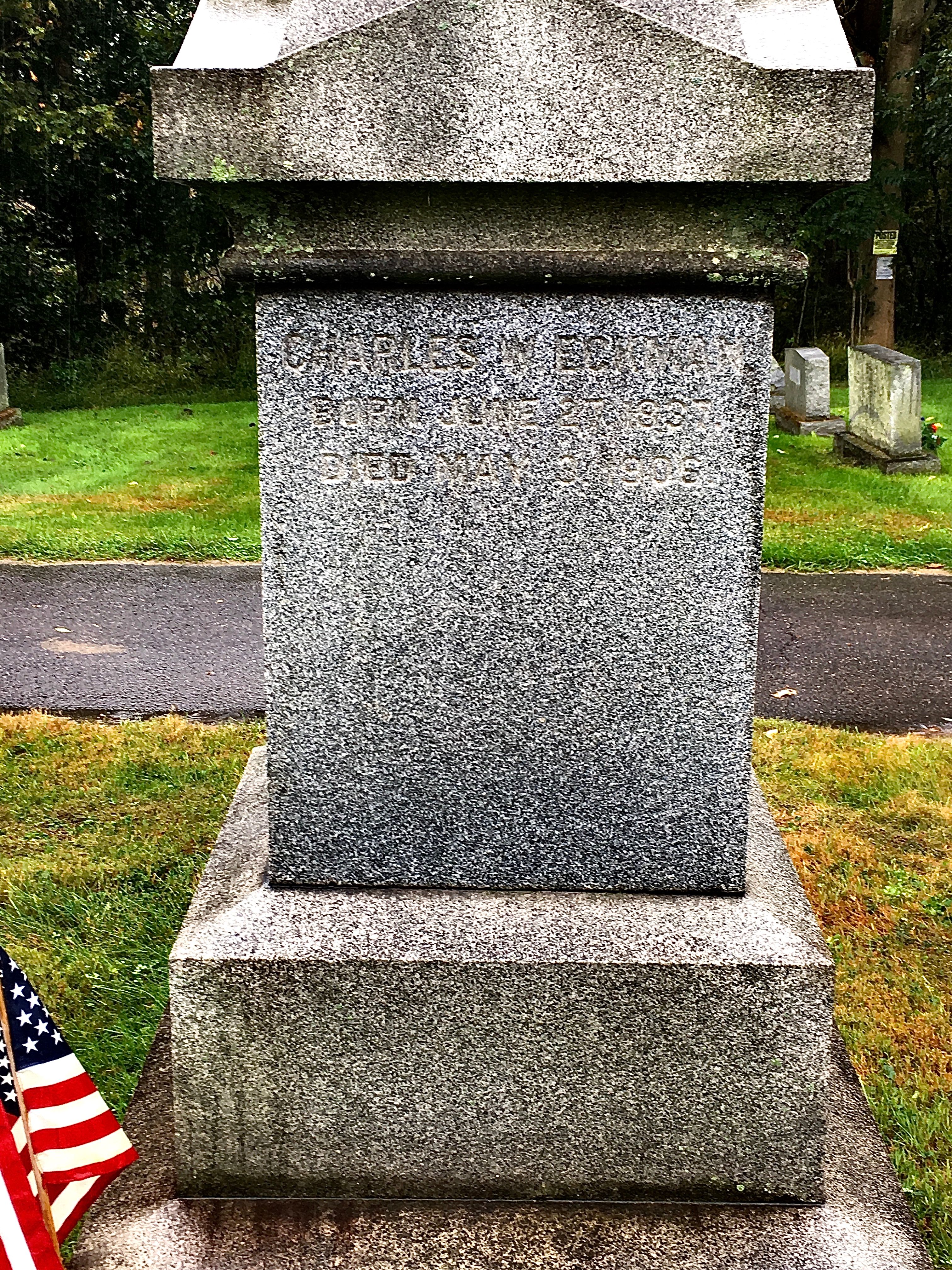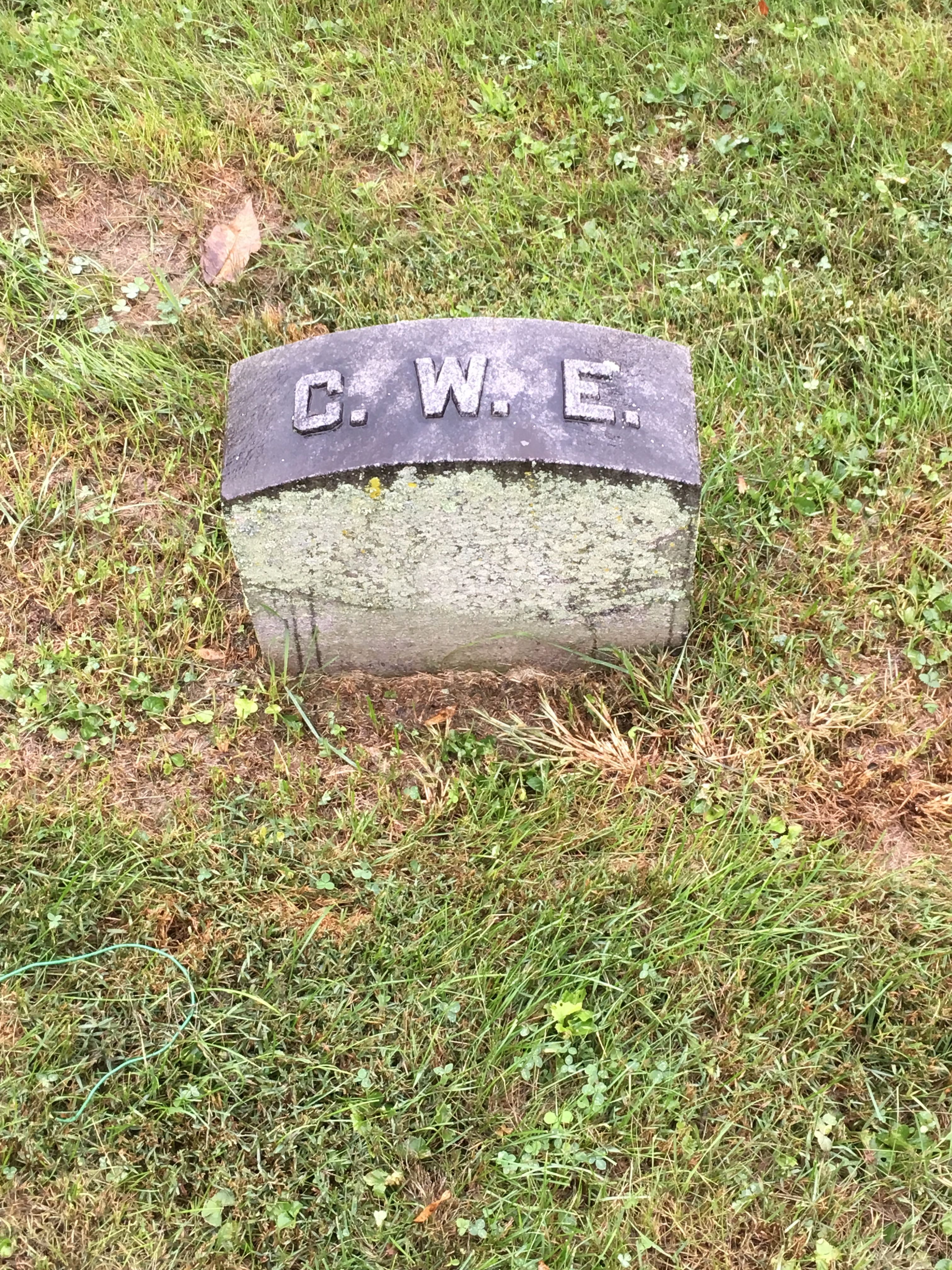COL. CHARLES WESLEY ECKMAN, now deceased, was a noted man in every
avenue of life. He was born June 27, 1837, at Punxsutawney, Pa., where he received
the meager educational advantages of its public schools at that day. He was first
educated to more peaceful fields. His youthful lost its attractions. An an early date he
came to Danville, Pa., to reside with an uncle. At the age of nineteen years, Garfield-
like he trod the towpath of the now abandoned Pennsylvania canal and became a boatman. At the tocsin of Civil war he enlisted, becoming a private in Company H, 93d Regiment of Pennsylvania Veteran Volunteers, and for a time was lost as a private soldier in the ranks of the Union army. But only for a time, for the retiring boy climbed rapidly from the musket way up into the shoulder- straps of military distinction.
As a Union soldier his term of service was long. He enlisted at Danville, Pa., Sept. 15,
1861, and constantly continued in the service until he was mustered out at Danville, Va., June 27, 1865. As already stated, his rise was rapid. He was promoted on the field twice in a single day for meritorious services, and at the close of the war he was in command of the 1st Brigade of the 2d Division of the 6th Corps of the Army of the Potomac — said to have been "The finest corps that ever faced a foe." He was assigned to the head of his corps (6th) at the grand review of the Army of the Potomac at Washington, D. C., after the sunset at Appomattox. He was then tendered the rank of brigadier general in the regular army service, which he declined with the modest remark that he had "seen enough of war." He was wounded three times in the battle of the Wilderness, but he never left the field until the end of that long and doubtful struggle. At the battle of Cedar Creek he had two horses shot under him in less than twenty minutes and was himself almost mortally wounded in the side by a bombshell that tore the head off his horse and the pommel off his saddle. He led that matchless charge up Marye's Heights at Fredericksburg and received special recognition from President Lincoln. He took part in the following battles fought by the Army of the Potomac : Siege of York- town, Va., April, 1862; Williamsburg, Va., May 5, 1862; Fair Oaks, Va., May 31, 1862; Malvern Hill, Va., July I, 1862; Chantilly, Va., Sept. i, 1862; Antietam, Md., Sept. 17, 1862; Fredericksburg, Va., Dec. 13, 1862, and Marye's Heights, Va. ; Salem Heights, Va., May 3, 1863; Gettysburg, Pa., July 2-3, 1863; Rappahannock Station, Va., Nov. 7, 1863; Mine Run, Va., Dec. 2, 1863; Wilderness, Va., •May 5-6, 1864; Spottsylvania Court House, Va., May 12-13, 1864; Cold Harbor, Va., June 1-2, 1864; before Petersburg, Va., June 18. 1864; Fort Stevens, D. C, July 17, 1864; Charlestown, Va., Aug. 21, 1864; Bunker Hill, Va., Sept. 13, 1864; Opequan, Va., Sept. 19, 1864; Flint Hill, Va., Sept. 21, 1864; Fisher's Hill, Va., Sept. 22, 1864; Cedar Creek, Va., Oct. 19, 1864; Winchester, Va., Oct. 19, 1864; before Petersburg, Va., March 25, 1865 ; before Petersburg, Va., April 2, 1865 ; Sailor's Creek, Va., April 6, 1865 ; Lee's surrender, April 9, 1865. At the close of the Rebellion Colonel Eck- man returned to Danville, Pa., where he was engaged in the mercantile business for the term of three years. In 1866 he, with other business associates, purchased the Danville Oil Refinery, which he operated for about three years. Meantime he was also engaged in other business pursuits. In 1869 he was appointed postmaster of Danville, Pa., which position he held continuously for seventeen and a half years. He then removed to the city of Reading, Pa., where he resided for about one year, thence removing to the city of Harrisburg, Pa., where he first became the superintendent of the Lochiel Iron and Steel Works and afterward superintendent of the Coleman blast furnace at that place. He then returned to Danville, Pa., where he became a manager of the Danville Bessemer Steel Company.
On July 3, 1866, Colonel Eckman married Sophia Starker Gearhart, a daughter of Mayberry and Mary Catherine Gearhart, and who still resides at the Roaring Creek home. Three children also still survive him:
Miss Katharine G. Eckman, who resides at home;
Miss Elizabeth Boone Eckman, a graduate of the Pennsylvania Hospital, Philadelphia, formerly superintendent of the Bryn Mawr Hospital, and of the Good Samaritan Hospital at Lexington, Ky.;
Hester R. Eckman, now the wife of George W. Darby, of the city of Harrisburg, Pa., and who, in turn, have two children, Elizabeth and Christine Darby.
Declining years lured Colonel Eckman back to the soil, and he spent his last years in his Roaring Creek home. The roar of a mountain stream called another Cincinnatus back to the plough. His home life was ideal. To know him there was to love him. He had no enemies. His friends were everywhere. In vanishing army circles they still affectionately call him "the old war horse of the 93d" — the regiment of four flags. The camp of the Sons of Veterans at Danville, Pa., still bears his honored name. He was the soul of honor and the badge of integrity.
He never left a duty and he never betrayed a trust. He was a modest man. The world never saw his scars. He told no story of matchless conflict. For years he suffered in silence the renewed pangs of Cedar Creek and then there fell on his wasted brow the breath of the eternal morning. He died May 3, 1906, regretted by all who ever knew him and to all of whom his life is still a gentle memory. "Sedgwick," his faithful steed, has long since ceased to graze along the shady hillside. A bridle without a rein and an old saddle, once flecked with blood and foam, still hang empty on memorial walls. But his magnificent sword — the gift of his soldiers — is still as spotless as his life. Time has tarnished neither. In the City of the Silent he sleeps as modestly as he lived. His monument is a reunited nation.
Colonel Eckman was a Freemason, belonging to the blue lodge and commandery at Danville, and to the chapter at Bloomsburg. He also held membership in the G. A. R. post at Danville.
He was active in politics for years, working long and effectively in the interest of the Republican party, in which his influence did much to shape local affairs.
He was brought up in the Methodist Episcopal Church.
Colonel Eckman was a grandson of John Eckman, a native of New Jersey, who settled with his family at Kline's Grove, Northumberland Co., Pa., where the family is still represented. He was a farmer all his life.
Isaac Eckman, son of John, and father of Colonel Eckman, was born Nov. 8, 1809, in Northumberland county, and died Nov. 3, 1874. He was a carpenter by trade and also followed farming.
COL. CHARLES WESLEY ECKMAN, now deceased, was a noted man in every
avenue of life. He was born June 27, 1837, at Punxsutawney, Pa., where he received
the meager educational advantages of its public schools at that day. He was first
educated to more peaceful fields. His youthful lost its attractions. An an early date he
came to Danville, Pa., to reside with an uncle. At the age of nineteen years, Garfield-
like he trod the towpath of the now abandoned Pennsylvania canal and became a boatman. At the tocsin of Civil war he enlisted, becoming a private in Company H, 93d Regiment of Pennsylvania Veteran Volunteers, and for a time was lost as a private soldier in the ranks of the Union army. But only for a time, for the retiring boy climbed rapidly from the musket way up into the shoulder- straps of military distinction.
As a Union soldier his term of service was long. He enlisted at Danville, Pa., Sept. 15,
1861, and constantly continued in the service until he was mustered out at Danville, Va., June 27, 1865. As already stated, his rise was rapid. He was promoted on the field twice in a single day for meritorious services, and at the close of the war he was in command of the 1st Brigade of the 2d Division of the 6th Corps of the Army of the Potomac — said to have been "The finest corps that ever faced a foe." He was assigned to the head of his corps (6th) at the grand review of the Army of the Potomac at Washington, D. C., after the sunset at Appomattox. He was then tendered the rank of brigadier general in the regular army service, which he declined with the modest remark that he had "seen enough of war." He was wounded three times in the battle of the Wilderness, but he never left the field until the end of that long and doubtful struggle. At the battle of Cedar Creek he had two horses shot under him in less than twenty minutes and was himself almost mortally wounded in the side by a bombshell that tore the head off his horse and the pommel off his saddle. He led that matchless charge up Marye's Heights at Fredericksburg and received special recognition from President Lincoln. He took part in the following battles fought by the Army of the Potomac : Siege of York- town, Va., April, 1862; Williamsburg, Va., May 5, 1862; Fair Oaks, Va., May 31, 1862; Malvern Hill, Va., July I, 1862; Chantilly, Va., Sept. i, 1862; Antietam, Md., Sept. 17, 1862; Fredericksburg, Va., Dec. 13, 1862, and Marye's Heights, Va. ; Salem Heights, Va., May 3, 1863; Gettysburg, Pa., July 2-3, 1863; Rappahannock Station, Va., Nov. 7, 1863; Mine Run, Va., Dec. 2, 1863; Wilderness, Va., •May 5-6, 1864; Spottsylvania Court House, Va., May 12-13, 1864; Cold Harbor, Va., June 1-2, 1864; before Petersburg, Va., June 18. 1864; Fort Stevens, D. C, July 17, 1864; Charlestown, Va., Aug. 21, 1864; Bunker Hill, Va., Sept. 13, 1864; Opequan, Va., Sept. 19, 1864; Flint Hill, Va., Sept. 21, 1864; Fisher's Hill, Va., Sept. 22, 1864; Cedar Creek, Va., Oct. 19, 1864; Winchester, Va., Oct. 19, 1864; before Petersburg, Va., March 25, 1865 ; before Petersburg, Va., April 2, 1865 ; Sailor's Creek, Va., April 6, 1865 ; Lee's surrender, April 9, 1865. At the close of the Rebellion Colonel Eck- man returned to Danville, Pa., where he was engaged in the mercantile business for the term of three years. In 1866 he, with other business associates, purchased the Danville Oil Refinery, which he operated for about three years. Meantime he was also engaged in other business pursuits. In 1869 he was appointed postmaster of Danville, Pa., which position he held continuously for seventeen and a half years. He then removed to the city of Reading, Pa., where he resided for about one year, thence removing to the city of Harrisburg, Pa., where he first became the superintendent of the Lochiel Iron and Steel Works and afterward superintendent of the Coleman blast furnace at that place. He then returned to Danville, Pa., where he became a manager of the Danville Bessemer Steel Company.
On July 3, 1866, Colonel Eckman married Sophia Starker Gearhart, a daughter of Mayberry and Mary Catherine Gearhart, and who still resides at the Roaring Creek home. Three children also still survive him:
Miss Katharine G. Eckman, who resides at home;
Miss Elizabeth Boone Eckman, a graduate of the Pennsylvania Hospital, Philadelphia, formerly superintendent of the Bryn Mawr Hospital, and of the Good Samaritan Hospital at Lexington, Ky.;
Hester R. Eckman, now the wife of George W. Darby, of the city of Harrisburg, Pa., and who, in turn, have two children, Elizabeth and Christine Darby.
Declining years lured Colonel Eckman back to the soil, and he spent his last years in his Roaring Creek home. The roar of a mountain stream called another Cincinnatus back to the plough. His home life was ideal. To know him there was to love him. He had no enemies. His friends were everywhere. In vanishing army circles they still affectionately call him "the old war horse of the 93d" — the regiment of four flags. The camp of the Sons of Veterans at Danville, Pa., still bears his honored name. He was the soul of honor and the badge of integrity.
He never left a duty and he never betrayed a trust. He was a modest man. The world never saw his scars. He told no story of matchless conflict. For years he suffered in silence the renewed pangs of Cedar Creek and then there fell on his wasted brow the breath of the eternal morning. He died May 3, 1906, regretted by all who ever knew him and to all of whom his life is still a gentle memory. "Sedgwick," his faithful steed, has long since ceased to graze along the shady hillside. A bridle without a rein and an old saddle, once flecked with blood and foam, still hang empty on memorial walls. But his magnificent sword — the gift of his soldiers — is still as spotless as his life. Time has tarnished neither. In the City of the Silent he sleeps as modestly as he lived. His monument is a reunited nation.
Colonel Eckman was a Freemason, belonging to the blue lodge and commandery at Danville, and to the chapter at Bloomsburg. He also held membership in the G. A. R. post at Danville.
He was active in politics for years, working long and effectively in the interest of the Republican party, in which his influence did much to shape local affairs.
He was brought up in the Methodist Episcopal Church.
Colonel Eckman was a grandson of John Eckman, a native of New Jersey, who settled with his family at Kline's Grove, Northumberland Co., Pa., where the family is still represented. He was a farmer all his life.
Isaac Eckman, son of John, and father of Colonel Eckman, was born Nov. 8, 1809, in Northumberland county, and died Nov. 3, 1874. He was a carpenter by trade and also followed farming.
Family Members
Sponsored by Ancestry
Advertisement
Explore more
Sponsored by Ancestry
Advertisement
